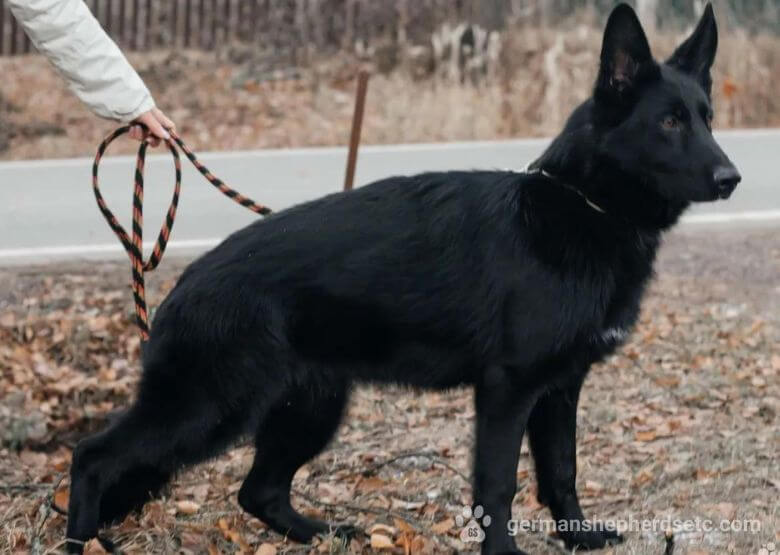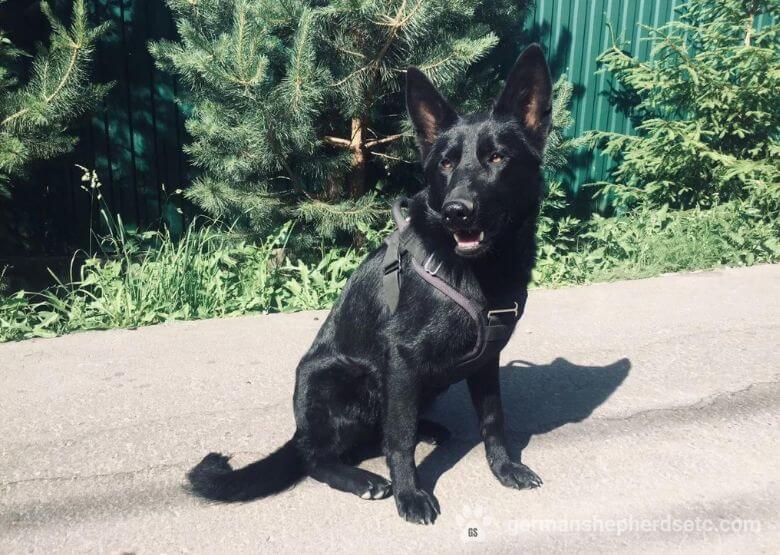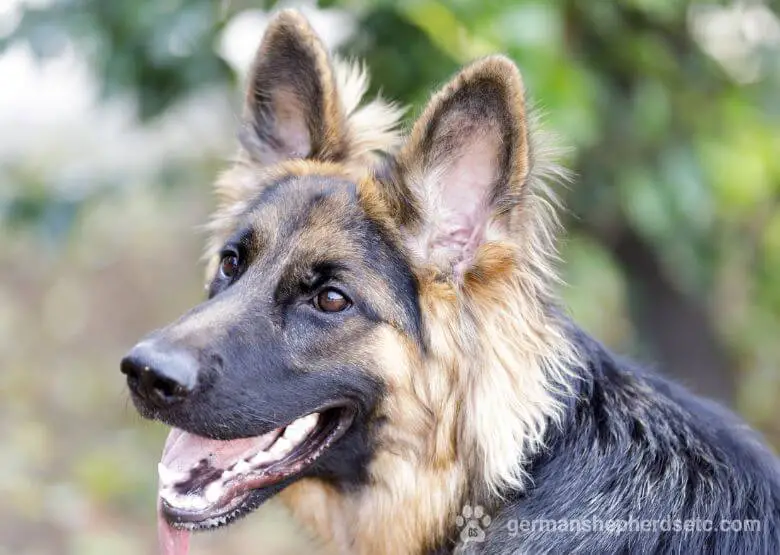Table of Contents
Your 9 month old German Shepherd is not a puppy anymore. This juvenile age is considered to correspond to that of human teenagers. There are a lot of physical and behavioral changes, so you need to know how to cope with them to help your puppy enter adulthood healthy and strong.
You have probably already learned that taking care of your pet since its first months was not an easy thing. Now, you may encounter other challenges related to your pup’s maturity and changing needs. This guide will tell you the details of these changes and what you need to do to help your doggy go through this period.
Size & Appearance
The appearance of your German Shepherd is changing to be like an adult. It has 85% of adult weight. Therefore, a male weighs 64-71 pounds (29-32 kg), while females gain a weight of 55-60 pounds (25-27 kg). You can see the difference, right?
However, your pup will continue to grow until about 12-15 months, so you will get a big dog. So far, the height of your boy pup can be 21-23 inches (53-58 centimeters), while a female can grow to around 19-21 inches (48-53 centimeters).
As for its teeth, your doggy already has a full set of 42 adult teeth. It may also experience teeth growing, but this happens quite rarely.
The coat is not puppy-like anymore. There are already two layers – the upper is coarse and thick, while the undercoat is soft and dense. You will deal with a lot of shedding. At this age, it is excessive. You need to talk to your vet or groomer about somehow reducing the shedding levels.
The ears have stood up by this age in most German Shepherds. However, German Shepherd’s floppy ears at 9 months may also be a norm.
Activity & Behavior
The most noticeable behavioral change is that your pup will start marking its territory at this age. The males use their urine for that. In addition, your boy may want to establish his dominance. It can start fighting with other dogs.
In fact, your 9 month old German Shepherd’s behavior relates to hormones very much. Your girl may experience its first heat cycle, known as the estrus period. The temperament of both boys and girls also changes. It becomes imbalanced. A female You need to watch out because, at this age, your doggy can give birth to puppies, so avoid places with other dogs and, especially, be aware of stray dogs around.
Your German Shepherd needs a lot of physical and mental exercises now. If your pup does not get them, you may see severe behavioral changes, like unnecessary barking, digging holes in the backyard, and destroying your household belongings.
The question of how much exercise your doggy needs is always important. You may expose it to about 45 minutes of training exercises, but not to too long hiking or swimming sessions. Don’t let your pup get overtired because its joints and bones are still growing and vulnerable to excessive physical loads. Teach your pup new tricks, ask it to find something hidden, or just walk with it.
You need to understand your pet’s body language to see whether you are doing everything properly. If your dog’s ears are firm and held back, it stands on all four paws, with sharp eyes, a straight head, and teeth displayed, it demonstrates aggression. It can also growl at this time. If its head is lowered down, with the ears lying to the back, and the tail kept between the legs, it is afraid of something. It can also poop or urinate with no control at the time of fear.
Your doggy can also show excessive excitement with a tongue out, a tail wagging rapidly, bright and wide eyes, and happy barking. It jumps up and down around, too. However, if you see your doggy’s ears perk up, the head held straight, lively eyes, and slow wagging of the tail, it is confident and alert.
Sometimes, your German Shepherd can display puppyish behavior, being goofy, clumsy, and stubborn, especially when you try to train it. Encourage good behavior every time and stop something bad and uncontrolled your pet may enjoy doing.
Your dog will sleep less over time. Though at this age, sleeping 15-18, or even 20 hours per day, is a norm. It will sleep well at night and may also need a 2-3 hour nap during the daytime.

Health & Care
Your German Shepherd of 9 months continues growing, but let’s assume it is completely healthy now. However, you need constantly keep an eye on its health condition to avoid problems in the future. Look out for quick weight gain. You need to monitor your pet’s weight every week to decide whether your pet gets enough food and exercise. Obesity is a bad issue that may lead to severe health conditions.
Your pup is lively and energetic. It can be the first sign of illness when you see it has become sluggish or lethargic. Moreover, you have to take your doggy to the vet if it vomits or loses its appetite. Diarrhea is also a signal that something is wrong.
German Shepherds are prone to some diseases more than any other breed. The health problems which are characteristic of them are the following:
- Hip Dysplasia. This issue is typical in German Shepherds. Its hip joints do not develop correctly, and it leads to extreme pain and arthritis.
- Elbow Dysplasia. Now, it is in the same condition as in the hips. Elbow joints that are not properly developed can hurt and inflame. Such dogs may have difficulties walking.
- Bloat. It is also known as gastric torsion or stomach twist. This life-threatening condition can affect German Shepherds and other breeds of large dogs. It happens when the dog is fed rarely, and it starts gulping food quickly.
- Epilepsy. This condition is neurological and may cause seizures. However, other conditions, such as low oxygen levels, low blood sugar, or high levels of stress, can also cause seizures. So, you need to show your doggy to the vet immediately to find out the reason.
- Degenerative Myelopathy. This illness is also neurological. It affects the spinal cord and progresses slowly to cause paralysis. Unfortunately, there is no treatment. All the efforts focus on managing the symptoms and not letting them worsen.
You need to be attentive to your pup’s health and go to the vet immediately as soon as you notice the first signs of any disorder. Early detection and treatment can prevent more severe problems.
If we speak about the care for your German Shepherd at this age, think about buying your pet toys. Your pup is energetic and curious, so having toys that are energy-burning and mentally stimulating can prevent the development of many unwanted health conditions. Think about buying such items as chew toys, interactive toys, puzzle and ball toys, and rope toys for your pup’s overall development.
Your pup has specific grooming needs at this age, too. You must brush it frequently to reduce shedding and straighten the inner coat. Brushing is also needed for taking away tangling mats. Brushing sessions can take place at least three times per week.
You also need to wipe any discharge from your doggy’s eyes. Though, if the discharge is excessive, consult your vet.
Perked-up ears are normal for this age already. Though, they may collect a lot of moisture or debris. You have to clean the ears with a ball of wet cotton just once per week. That will reduce the possibility of ear infections. Talk to your veterinarian if you notice an abnormal discharge from the ears. If you feel the foul smell or see your dog’s constant tilting of the head, you need to ask for help, too.
Your pet’s teeth need care, too. Your dog needs to have a scissor bite. If it is undershot or overshot, consult your vet. They can also recommend you appropriate toothpaste and toothbrush. You must clean your dog’s teeth regularly and eliminate any foul smell or tartar in your pup’s mouth.
Since your pup is growing fast, its claws also grow, which can lead to inconveniences. So, you need to trim its nails twice a month. It will also prevent tearing everything in sight with these sharp and curved claws. Never cut the nails too short, or you may injure your dog’s paws.
Feeding
Think about the appropriate diet for your 9 month old GSD because it may affect its physical and mental health. The diet has to include proteins, fats, carbohydrates, amino acids, and minerals. In addition, your doggy also needs a bowl of fresh water with free access to it whenever it wants to drink.
Your pet is growing, so proteins should make up 22% of the diet. The best sources of protein are fish and beef. Fats should take 8% of all the nutritional value. Ensure that carbs are low because they are difficult to digest for Shepherds at this age.
There are various types of diets you can feed your doggy. They are dry, wet, homemade, or raw foods. Dry food is kibble that contains a lot of calories. You have to use high-quality kibble and give your dog smaller amounts of it because it is very nutritious. You can add some water to make this food more palatable if your pup finds it difficult to crack.
Wet food is usually canned. It contains 90% of moisture and has fewer calories. It means that the portions need to be bigger if you don’t want your puppy to cry from hunger. To make the best choice, you need to find out what type of food your doggy would prefer, and remember that dry food will cost you more than wet food. You can also mix dry and wet food in your dog’s diet, or give it dry and wet food in different servings.
Homemade food is another option and the best alternative to commercial products. However, you must be very careful when deciding on this option. Ensure that your pup has enough proteins and not too many carbohydrates. Your pet may have metabolic or digestive issues if you don’t consider these things. You need to talk to your vet if you want to give your German Shepherd homemade food.
You may also consider a natural raw diet. It includes the ingredients your pup would probably eat if it grows in the wild. The diet consists of raw meat, fish, and vegetables. However, you must ensure that such a diet meets all your pet’s nutritional requirements.
The main things you may need to consider whatever the diet you have chosen for your pup is:
- feeding your dog according to its age and size;
- taking into account energy requirements – show lines may need less food than working lines;
- giving your pup products rich in proteins;
- wet food amounts are always higher than those of dry food;
- remembering to give your doggy a lot of water;
- offering your pet low-caloric treats.
If you are not sure which variant to choose, talk to your vet.
Training

This task is essential for every 9 month old German Shepherd puppy. You can continue house training and socialization classes. As well, teach your pet the basic commands that will be vital for your further communication, such as “Sit,” “Down,” and “Come.”
If you feel that you don’t know how to do the training sessions, you may address your questions to a professional dog trainer. Your puppy at this age is very smart, curious, and intelligent. It will be happy to please you and do what you ask it to do. However, remember that its attention span is very short, so your training session cannot last longer than 5-15 minutes.
Positive encouragement is essential at this point. It may be in the form of treats, praising, or patting. Don’t expect fast results, and remember that your doggy is not stupid – it is too young to concentrate on one thing for a very long time. You may need to repeat your training over and over again. Never use physical strength or punishment when you are training your puppy. It will fear you and start displaying neglect or aggression soon. Try to be consistent and patient; you will get the doggy of your dream and your most loyal friend.
Your pup also needs further socialization. Let it be exposed to different places and sounds. You may take your doggy to the park to interact with other people and animals. Starting house training is essential at this age point. You will also need to do obedience training. Critical commands are the priority at this stage. Sometimes, they may save your pet’s life and help avoid many accidents.
FAQ
How much should a 9 month old German Shepherd eat?
Your pup needs 2-3 cups of dry food spread over 2-3 meals per day. However, you need to feed your doggy considering its line, size, and nutritional needs.
How much exercise does a 9 month old German Shepherd need?
You may exercise your pup for about two hours a day, divided into two sessions. Walking should take about 45 minutes (5 minutes per every month of life), and all other exercises may include playing and training.
Is a German Shepherd full-grown at 9 months?
Your pup looks like an adult dog, but it is not full-grown yet. It is only 80-85% of its adult size. German Shepherds continue to grow until they are 12-15 months old.
Final Thoughts
Your 9 month old GSD is a juvenile. It grows quickly, and its energy levels grow with it. Give your pet a lot of physical and mental exercises to keep it in good condition. You will avoid unwanted behavior in this way. It is especially important because your pup starts to mature, and its hormones change its behavior. Toys and interactive games will help in overcoming these challenges.
If you provide your doggy with appropriate care and training, it will soon become a healthy and happy adult dog. Don’t forget to socialize with your pet to eliminate all the unwanted traits, and you will get a loyal and intelligent friend and companion.
